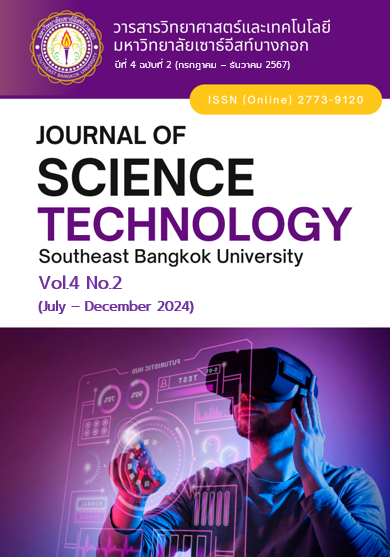การพัฒนาบอร์ดเกมการศึกษาความจริงเสริมสำหรับการเรียนรู้โดยใช้เกมเป็นฐาน เรื่อง โปรแกรม Scratch ของนักเรียนระดับชั้นประถมศึกษาปีที่ 4 บทความวิจัย
Main Article Content
บทคัดย่อ
การวิจัยครั้งนี้มีจุดประสงค์1) เพื่อพัฒนาบอร์ดเกมการศึกษาความจริงเสริม สำหรับการเรียนรู้โดยใช้เกมเป็นฐาน เรื่อง โปรแกรม Scratch ของนักเรียนระดับชั้นประถมศึกษาปีที่ 4 2) เพื่อหาประสิทธิภาพของบอร์ดเกมการศึกษาความจริงเสริม สำหรับการเรียนรู้โดยใช้เกมเป็นฐาน เรื่องโปรแกรม Scratch ของนักเรียนระดับชั้นประถมศึกษาปีที่ 4 3) เพื่อเปรียบเทียบผลสัมฤทธิ์ทางการเรียนของนักเรียนระหว่างก่อนและหลังเรียนด้วยบอร์ดเกมการศึกษาความจริงเสริม สำหรับการเรียนรู้โดยใช้เกมเป็นฐาน เรื่อง โปรแกรม Scratch ของนักเรียนระดับชั้นประถมศึกษาปีที่ 4 4) เพื่อศึกษาความพึงพอใจของนักเรียนที่มีต่อการใช้บอร์ดเกมการศึกษา AR สำหรับการเรียนรู้โดยใช้เกมเป็นฐาน เรื่อง โปรแกรม Scratch ของนักเรียนชั้นประถมศึกษาปีที่ 4 กลุ่มตัวอย่าง คือ นักเรียนชั้นประถมศึกษาปีที่ 4 โรงเรียนบ้านฉลอง อำเภอเมือง จังหวัดภูเก็ต จำนวน นักเรียน 31 คน เครื่องมือที่ใช้ในการวิจัย ได้แก่ บอร์ดเกมการศึกษาความจริงเสริม เรื่อง โปรแกรม Scratch แบบทดสอบวัดผลสัมฤทธิ์ทางการเรียน เรื่อง โปรแกรม Scratch ในการวัดผลสัมฤทธิ์ก่อนและหลังเรียน และแบบประเมินความพึงพอใจ โดยใช้สถิติการหาค่าเฉลี่ยและส่วนเบี่ยงเบนมาตรฐานและค่าสถิติทดสอบ (t-test) แบบ dependent
ผลการวิจัยพบว่า 1) ผลการประเมินคุณภาพสื่อบอร์ดเกมการศึกษาความจริงเสริม ของนักเรียนชั้นประถมศึกษาปีที่ 4 จากผู้เชี่ยวชาญมีค่าเฉลี่ย =4.93 ซึ่งมีคุณภาพโดยรวมอยู่ในระดับมากที่สุด 2) บอร์ดเกมการศึกษาความจริงเสริม สำหรับการเรียนรู้โดยใช้เกมเป็นฐาน เรื่อง โปรแกรม Scratch ของนักเรียนระดับชั้นประถมศึกษาปีที่ 4 โดยมีประสิทธิภาพ 81.7/86.1 3) ผลสัมฤทธิ์ทางการเรียน เรื่อง โปรแกรม Scratch ของนักเรียนชั้นประถมศึกษาปีที่ 4 นักเรียนมีผลสัมฤทธิ์ทางการเรียนวิชาวิทยาการคำนวณสูงกว่า หลังใช้บอร์ดเกมการศึกษาความจริงเสริม พบว่ามีคะแนนเฉลี่ยหลังเรียนเป็น 13.74 สูงกว่าคะแนนก่อนเรียนคือ 6.94 4) ความพึงพอใจของนักเรียนหลังใช้บอร์ดเกมการศึกษาความจริงเสริม เรื่อง โปรแกรม Scratch อยู่ในระดับมากที่สุด =4.63 เมื่อพิจารณาเป็นรายข้อที่นักเรียนตอบแบบประเมินมีความพึงพอใจสูงสุด 3 อันดับแรก คือ บอร์ดเกมมีความน่าสนใจและดึงดูด ( =4.90) รองลงมา คือ รู้สึกสนุกในการเรียน ( =4.87) และได้ความรู้เพิ่มขึ้นหลังจากศึกษาผ่านบอร์ดเกมเรื่องนี้ ( =4.84)
Article Details

อนุญาตภายใต้เงื่อนไข Creative Commons Attribution-NonCommercial-NoDerivatives 4.0 International License.
บทความที่ได้รับการตีพิมพ์และเป็นลิขสิทธิ์ของวารสารวิทยาศาสตร์และเทคโนโลยี มหาวิทยาลัยเซาธ์อีสท์บางกอก
เอกสารอ้างอิง
S. Srijanta et al., "Creating and using games for active learning in the classroom: Creating a new learning environment filled with happiness - EDUCA 2024," [Online]. Available: https://dev.educathai.com/events/2019/44. [Accessed: Dec. 13, 2023].
P. Wongtatham and J. Samat, "Development of steps to create learning board games using the Design Thinking concept," Journal of Education, Khon Kaen University (EDKKUJ), no. 46, Art. no. 4, Dec. 2023, doi: 10.14456/edkkuj.2020.x.
S. Duangratanaekchai, "Game-based learning: An alternative for modern science education," Magazine of the Institute for the Promotion of Teaching Science and Technology, vol. 47, Art. no. 216, Feb. 2019. [Online]. Available: https://emagazine.ipst.ac.th/216/#24. [Accessed: Dec. 13, 2023].
W. Chumphaet, "Development of educational game systems to promote learning in the classroom," Southern Technology Journal, vol. 13, Art. no. 2, 2020.
National Science Museum, Ministry of Higher Education, Science, Research, and Innovation, "What is AR and VR, and how are they different?" [Online]. Available: https://www.nsm.or.th/nsm/th/node/4327. [Accessed: Aug. 19, 2023].
T. Thepputhorn, "Development of augmented reality-based educational board games to promote learning outcomes in third-grade students," Journal of Educational Measurement, Educational Testing and Psychological Office, vol. 39, Art. no. 105, Apr. 2022.
S. Tippchaiyamada and L. Chutikorn, Play and Games for Early Childhood: Teaching Media for Early Childhood Education, 1st ed. Sukhothai Thammathirat Open University, 2012.
B. Sanansieng, "Providing experiences to train observation and reasoning skills in young children: Teaching materials for early childhood life experience enhancement," 5th ed. Nonthaburi: Sukhothai Thammathirat Open University, 2014.
Ministry of Education, "Early childhood education curriculum guide 2017 for children ages 3-6," Academic and Educational Standards Office, Office of the Basic Education Commission, Bangkok: Agricultural Cooperatives Printing House, 2017.
S. Chaiprasop, "Developing basic mathematics skills for young children using educational games at Pong Nam Ron Witthaya School," M.S. thesis, Curriculum and Instruction, Chiang Mai University, 2015.
K. Suyaepiang, "The effects of using educational games to develop critical thinking in young children," M.S. thesis, Curriculum and Instruction, Chiang Rai Rajabhat University, 2017.
S. Achavanantakul, Board Game Universe: One Board Universe. Bangkok: Salmon Publishing, 2016.
R. Phuttharangsri, "Application of board games to develop communication skills in performance," M.S. thesis, Chulalongkorn University, 2017.
T. Kaemmanee, Teaching Science: Knowledge for Organizing Effective Learning Processes, 18th ed. Bangkok: Chulalongkorn University Press, 2014.
T. Suwannakannit, "Designing card games to enhance understanding in learning the communication design curriculum," Proceedings of the 13th National Conference on Research and Innovation for National Development, Phitsanulok: Naresuan University, 2017.
W. Duangphumeth and W. Kaewurai, "Managing learning in the Thailand 4.0 era with active learning," Journal of Humanities and Social Sciences, Graduate School, Pibulsongkram Rajabhat University, 2017.
P. Pramot, "Developing a mathematics learning activity set using cooperative learning along with games to promote learning outcomes and desired mathematical characteristics for grade 5 students," M.S. thesis, Curriculum and Instruction, Graduate School, Chiang Mai Rajabhat University, 2018.
Royal Institute, "Augmented Reality (AR)," Aug. 14, 2019. [Online]. Available: https://www.facebook.com/photo.php?fbid=2527570800634333&id=206167399441363&set=a.2527569647301115. [Accessed: Oct. 30, 2023].
P. Srifa, "Turning 3D roles into virtual reality (Augmented Reality)," Lecture notes, Nakhon Pathom: Faculty of Education, Silpakorn University, 2013.
W. Meesuwan, Designing and Developing Learning Media with Augmented Reality Technology. Bangkok: Chuladis Printing, 2013.
J. Na Songkhla, "Designing Digital Learning," Bangkok: Chulalongkorn University Press, 2018.
G. Kuder and M. Richardson, "The theory of estimation of test reliability," Psychometrika, 1937.
R. Likert, "The method of constructing and attitude scale," in Attitude Theory and Measurement, New York: Wiley & Son, 1967, pp. 90–95.
P. Rueangrong, "Development of a tablet-based learning model with problem-based learning," Journal of Educational Innovation, vol. 21, no. 1, pp. 156–171, Nov. 2019.
A. Pridakorn, "Designing an educational board game on natural color circles for grade 6 students," M.S. thesis, Faculty of Education, Srinakharinwirot University, 2014.


